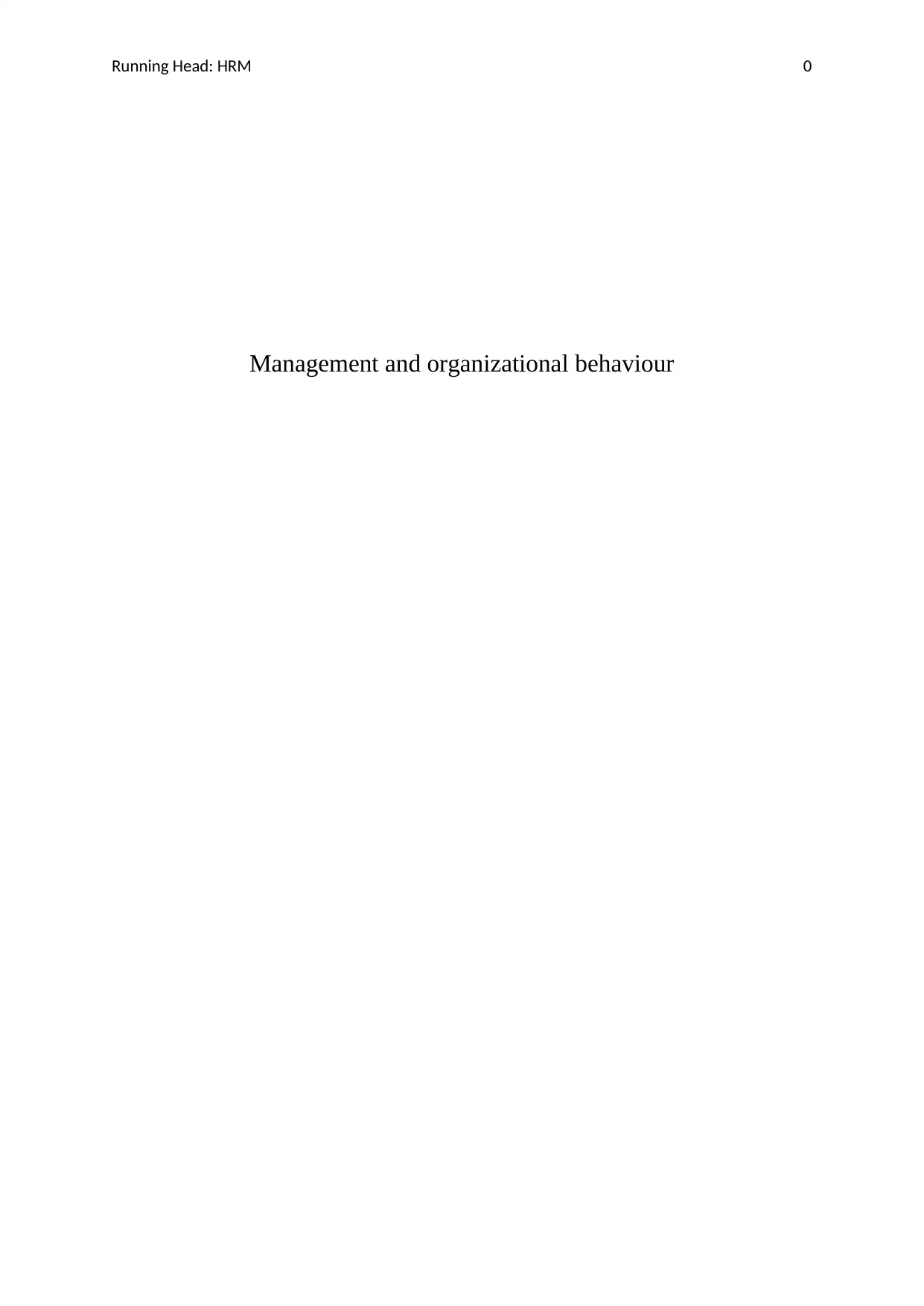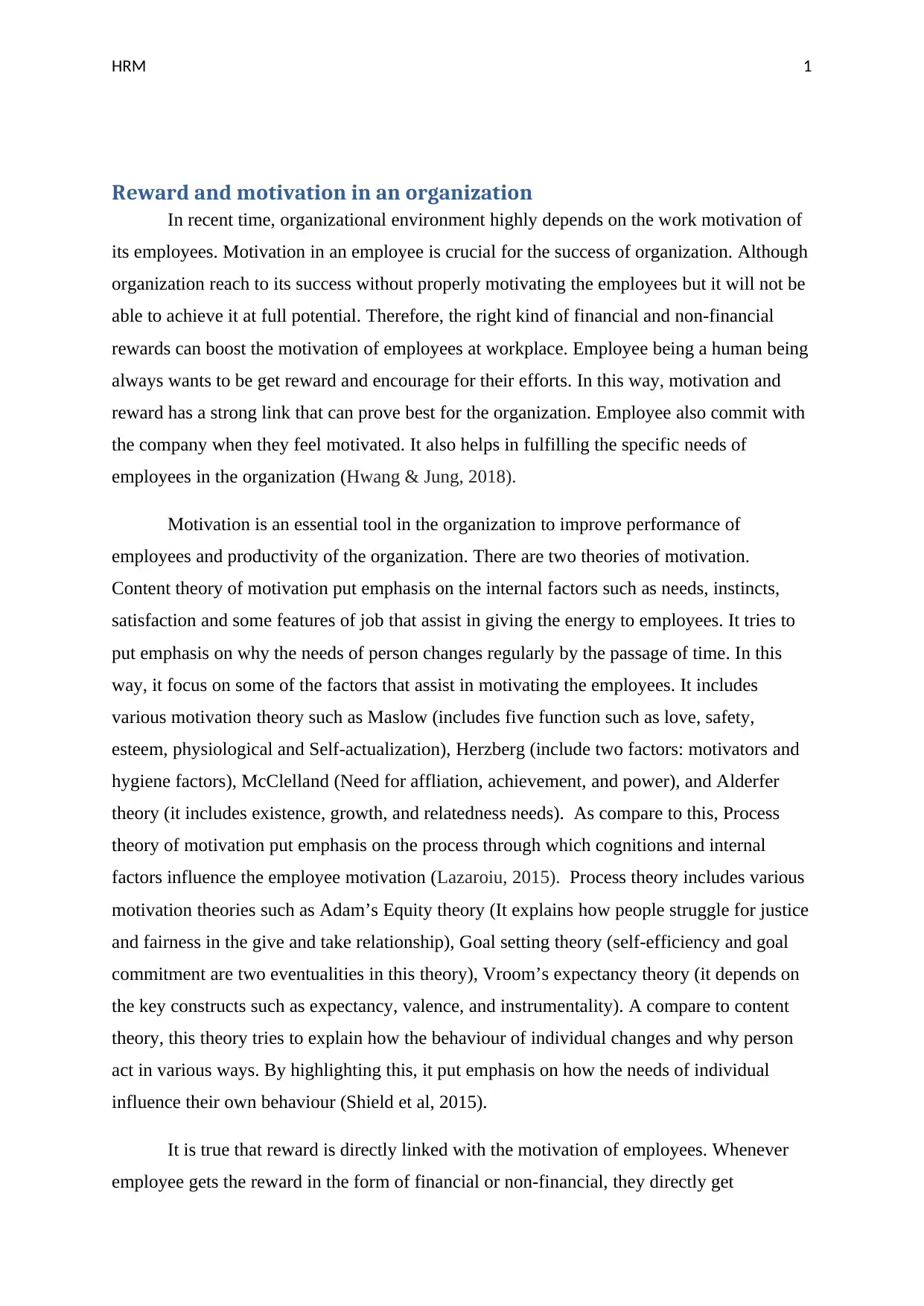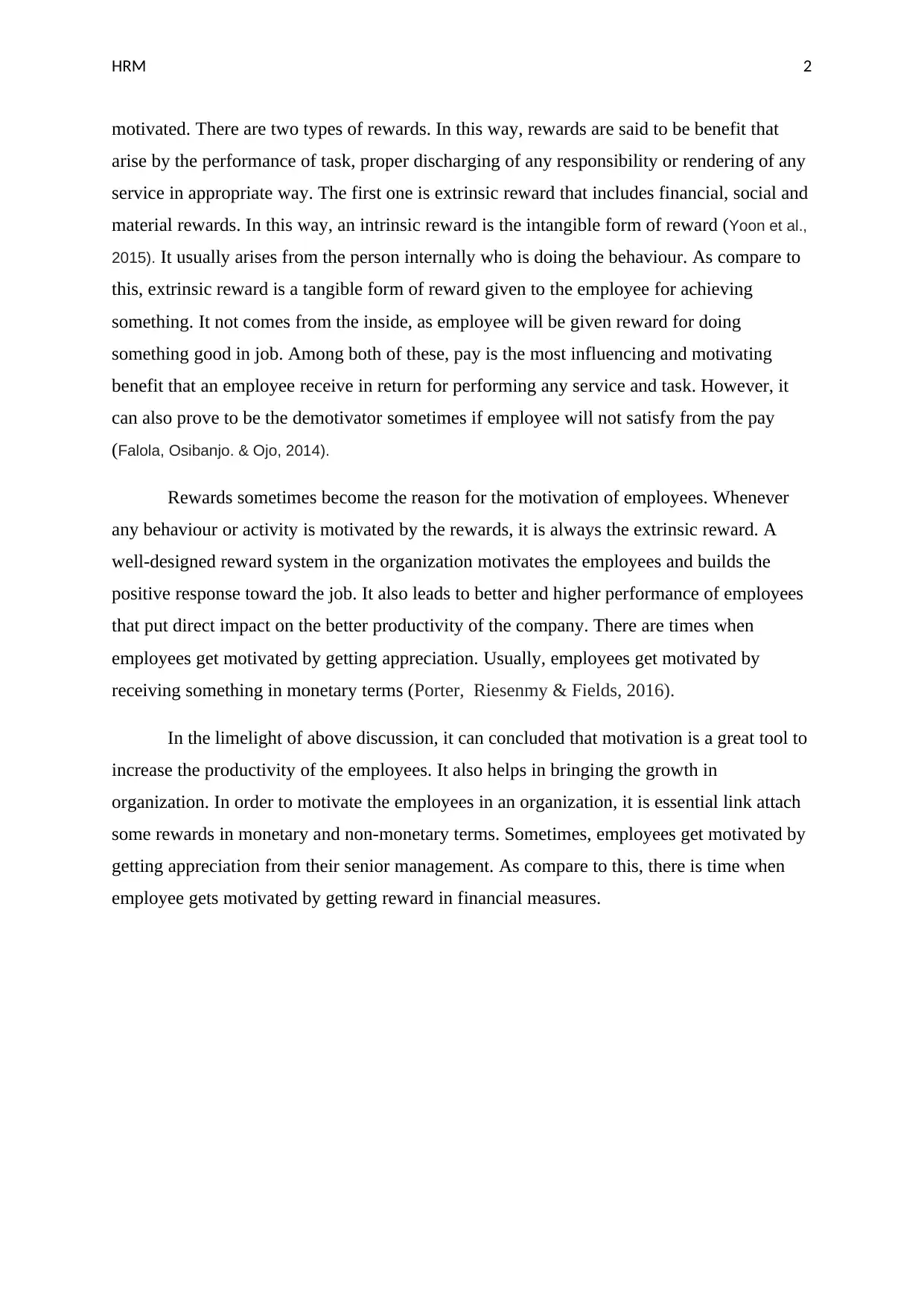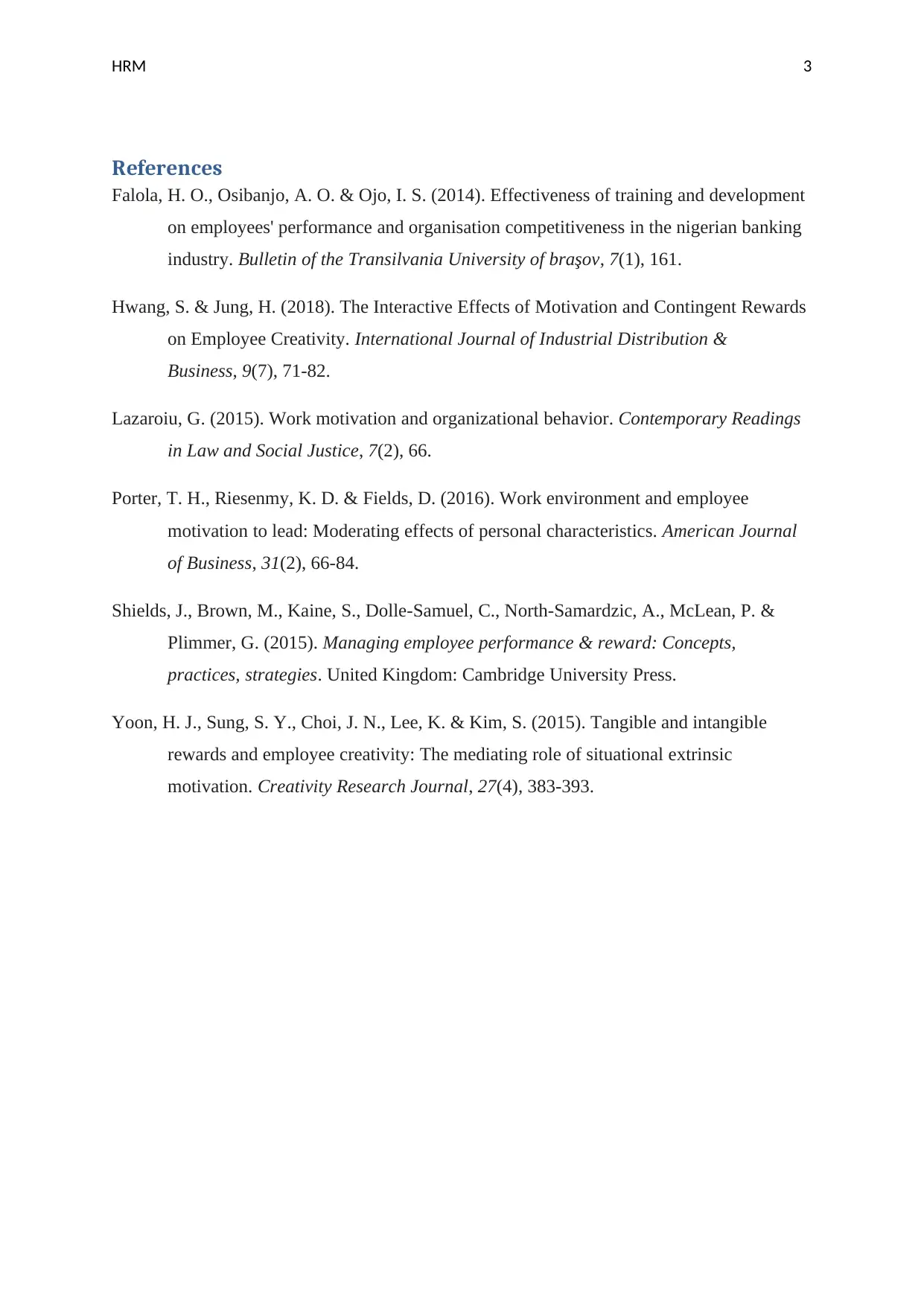MGT 2103 Organizational Behavior: Motivation and Reward Techniques
VerifiedAdded on 2023/04/25
|4
|1140
|238
Essay
AI Summary
This essay explores the crucial role of employee motivation in organizational success, focusing on the link between motivation and rewards. It delves into content and process theories of motivation, including Maslow's hierarchy of needs, Herzberg's two-factor theory, Adam's Equity theory, and Vroom's expectancy theory. The essay differentiates between extrinsic and intrinsic rewards, highlighting the motivational impact of financial and non-financial incentives. It concludes that a well-designed reward system is essential for boosting employee performance, job satisfaction, and overall organizational productivity. Desklib provides students access to solved assignments and learning resources.

Running Head: HRM 0
Management and organizational behaviour
Management and organizational behaviour
Paraphrase This Document
Need a fresh take? Get an instant paraphrase of this document with our AI Paraphraser

HRM 1
Reward and motivation in an organization
In recent time, organizational environment highly depends on the work motivation of
its employees. Motivation in an employee is crucial for the success of organization. Although
organization reach to its success without properly motivating the employees but it will not be
able to achieve it at full potential. Therefore, the right kind of financial and non-financial
rewards can boost the motivation of employees at workplace. Employee being a human being
always wants to be get reward and encourage for their efforts. In this way, motivation and
reward has a strong link that can prove best for the organization. Employee also commit with
the company when they feel motivated. It also helps in fulfilling the specific needs of
employees in the organization (Hwang & Jung, 2018).
Motivation is an essential tool in the organization to improve performance of
employees and productivity of the organization. There are two theories of motivation.
Content theory of motivation put emphasis on the internal factors such as needs, instincts,
satisfaction and some features of job that assist in giving the energy to employees. It tries to
put emphasis on why the needs of person changes regularly by the passage of time. In this
way, it focus on some of the factors that assist in motivating the employees. It includes
various motivation theory such as Maslow (includes five function such as love, safety,
esteem, physiological and Self-actualization), Herzberg (include two factors: motivators and
hygiene factors), McClelland (Need for affliation, achievement, and power), and Alderfer
theory (it includes existence, growth, and relatedness needs). As compare to this, Process
theory of motivation put emphasis on the process through which cognitions and internal
factors influence the employee motivation (Lazaroiu, 2015). Process theory includes various
motivation theories such as Adam’s Equity theory (It explains how people struggle for justice
and fairness in the give and take relationship), Goal setting theory (self-efficiency and goal
commitment are two eventualities in this theory), Vroom’s expectancy theory (it depends on
the key constructs such as expectancy, valence, and instrumentality). A compare to content
theory, this theory tries to explain how the behaviour of individual changes and why person
act in various ways. By highlighting this, it put emphasis on how the needs of individual
influence their own behaviour (Shield et al, 2015).
It is true that reward is directly linked with the motivation of employees. Whenever
employee gets the reward in the form of financial or non-financial, they directly get
Reward and motivation in an organization
In recent time, organizational environment highly depends on the work motivation of
its employees. Motivation in an employee is crucial for the success of organization. Although
organization reach to its success without properly motivating the employees but it will not be
able to achieve it at full potential. Therefore, the right kind of financial and non-financial
rewards can boost the motivation of employees at workplace. Employee being a human being
always wants to be get reward and encourage for their efforts. In this way, motivation and
reward has a strong link that can prove best for the organization. Employee also commit with
the company when they feel motivated. It also helps in fulfilling the specific needs of
employees in the organization (Hwang & Jung, 2018).
Motivation is an essential tool in the organization to improve performance of
employees and productivity of the organization. There are two theories of motivation.
Content theory of motivation put emphasis on the internal factors such as needs, instincts,
satisfaction and some features of job that assist in giving the energy to employees. It tries to
put emphasis on why the needs of person changes regularly by the passage of time. In this
way, it focus on some of the factors that assist in motivating the employees. It includes
various motivation theory such as Maslow (includes five function such as love, safety,
esteem, physiological and Self-actualization), Herzberg (include two factors: motivators and
hygiene factors), McClelland (Need for affliation, achievement, and power), and Alderfer
theory (it includes existence, growth, and relatedness needs). As compare to this, Process
theory of motivation put emphasis on the process through which cognitions and internal
factors influence the employee motivation (Lazaroiu, 2015). Process theory includes various
motivation theories such as Adam’s Equity theory (It explains how people struggle for justice
and fairness in the give and take relationship), Goal setting theory (self-efficiency and goal
commitment are two eventualities in this theory), Vroom’s expectancy theory (it depends on
the key constructs such as expectancy, valence, and instrumentality). A compare to content
theory, this theory tries to explain how the behaviour of individual changes and why person
act in various ways. By highlighting this, it put emphasis on how the needs of individual
influence their own behaviour (Shield et al, 2015).
It is true that reward is directly linked with the motivation of employees. Whenever
employee gets the reward in the form of financial or non-financial, they directly get

HRM 2
motivated. There are two types of rewards. In this way, rewards are said to be benefit that
arise by the performance of task, proper discharging of any responsibility or rendering of any
service in appropriate way. The first one is extrinsic reward that includes financial, social and
material rewards. In this way, an intrinsic reward is the intangible form of reward (Yoon et al.,
2015). It usually arises from the person internally who is doing the behaviour. As compare to
this, extrinsic reward is a tangible form of reward given to the employee for achieving
something. It not comes from the inside, as employee will be given reward for doing
something good in job. Among both of these, pay is the most influencing and motivating
benefit that an employee receive in return for performing any service and task. However, it
can also prove to be the demotivator sometimes if employee will not satisfy from the pay
(Falola, Osibanjo. & Ojo, 2014).
Rewards sometimes become the reason for the motivation of employees. Whenever
any behaviour or activity is motivated by the rewards, it is always the extrinsic reward. A
well-designed reward system in the organization motivates the employees and builds the
positive response toward the job. It also leads to better and higher performance of employees
that put direct impact on the better productivity of the company. There are times when
employees get motivated by getting appreciation. Usually, employees get motivated by
receiving something in monetary terms (Porter, Riesenmy & Fields, 2016).
In the limelight of above discussion, it can concluded that motivation is a great tool to
increase the productivity of the employees. It also helps in bringing the growth in
organization. In order to motivate the employees in an organization, it is essential link attach
some rewards in monetary and non-monetary terms. Sometimes, employees get motivated by
getting appreciation from their senior management. As compare to this, there is time when
employee gets motivated by getting reward in financial measures.
motivated. There are two types of rewards. In this way, rewards are said to be benefit that
arise by the performance of task, proper discharging of any responsibility or rendering of any
service in appropriate way. The first one is extrinsic reward that includes financial, social and
material rewards. In this way, an intrinsic reward is the intangible form of reward (Yoon et al.,
2015). It usually arises from the person internally who is doing the behaviour. As compare to
this, extrinsic reward is a tangible form of reward given to the employee for achieving
something. It not comes from the inside, as employee will be given reward for doing
something good in job. Among both of these, pay is the most influencing and motivating
benefit that an employee receive in return for performing any service and task. However, it
can also prove to be the demotivator sometimes if employee will not satisfy from the pay
(Falola, Osibanjo. & Ojo, 2014).
Rewards sometimes become the reason for the motivation of employees. Whenever
any behaviour or activity is motivated by the rewards, it is always the extrinsic reward. A
well-designed reward system in the organization motivates the employees and builds the
positive response toward the job. It also leads to better and higher performance of employees
that put direct impact on the better productivity of the company. There are times when
employees get motivated by getting appreciation. Usually, employees get motivated by
receiving something in monetary terms (Porter, Riesenmy & Fields, 2016).
In the limelight of above discussion, it can concluded that motivation is a great tool to
increase the productivity of the employees. It also helps in bringing the growth in
organization. In order to motivate the employees in an organization, it is essential link attach
some rewards in monetary and non-monetary terms. Sometimes, employees get motivated by
getting appreciation from their senior management. As compare to this, there is time when
employee gets motivated by getting reward in financial measures.
⊘ This is a preview!⊘
Do you want full access?
Subscribe today to unlock all pages.

Trusted by 1+ million students worldwide

HRM 3
References
Falola, H. O., Osibanjo, A. O. & Ojo, I. S. (2014). Effectiveness of training and development
on employees' performance and organisation competitiveness in the nigerian banking
industry. Bulletin of the Transilvania University of braşov, 7(1), 161.
Hwang, S. & Jung, H. (2018). The Interactive Effects of Motivation and Contingent Rewards
on Employee Creativity. International Journal of Industrial Distribution &
Business, 9(7), 71-82.
Lazaroiu, G. (2015). Work motivation and organizational behavior. Contemporary Readings
in Law and Social Justice, 7(2), 66.
Porter, T. H., Riesenmy, K. D. & Fields, D. (2016). Work environment and employee
motivation to lead: Moderating effects of personal characteristics. American Journal
of Business, 31(2), 66-84.
Shields, J., Brown, M., Kaine, S., Dolle-Samuel, C., North-Samardzic, A., McLean, P. &
Plimmer, G. (2015). Managing employee performance & reward: Concepts,
practices, strategies. United Kingdom: Cambridge University Press.
Yoon, H. J., Sung, S. Y., Choi, J. N., Lee, K. & Kim, S. (2015). Tangible and intangible
rewards and employee creativity: The mediating role of situational extrinsic
motivation. Creativity Research Journal, 27(4), 383-393.
References
Falola, H. O., Osibanjo, A. O. & Ojo, I. S. (2014). Effectiveness of training and development
on employees' performance and organisation competitiveness in the nigerian banking
industry. Bulletin of the Transilvania University of braşov, 7(1), 161.
Hwang, S. & Jung, H. (2018). The Interactive Effects of Motivation and Contingent Rewards
on Employee Creativity. International Journal of Industrial Distribution &
Business, 9(7), 71-82.
Lazaroiu, G. (2015). Work motivation and organizational behavior. Contemporary Readings
in Law and Social Justice, 7(2), 66.
Porter, T. H., Riesenmy, K. D. & Fields, D. (2016). Work environment and employee
motivation to lead: Moderating effects of personal characteristics. American Journal
of Business, 31(2), 66-84.
Shields, J., Brown, M., Kaine, S., Dolle-Samuel, C., North-Samardzic, A., McLean, P. &
Plimmer, G. (2015). Managing employee performance & reward: Concepts,
practices, strategies. United Kingdom: Cambridge University Press.
Yoon, H. J., Sung, S. Y., Choi, J. N., Lee, K. & Kim, S. (2015). Tangible and intangible
rewards and employee creativity: The mediating role of situational extrinsic
motivation. Creativity Research Journal, 27(4), 383-393.
1 out of 4
Related Documents
Your All-in-One AI-Powered Toolkit for Academic Success.
+13062052269
info@desklib.com
Available 24*7 on WhatsApp / Email
![[object Object]](/_next/static/media/star-bottom.7253800d.svg)
Unlock your academic potential
Copyright © 2020–2026 A2Z Services. All Rights Reserved. Developed and managed by ZUCOL.




